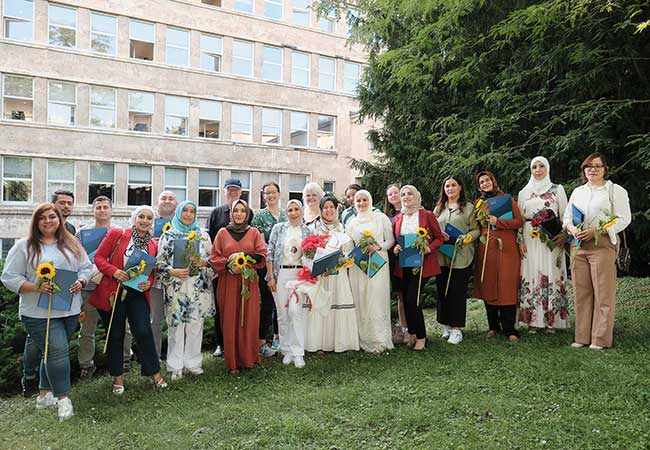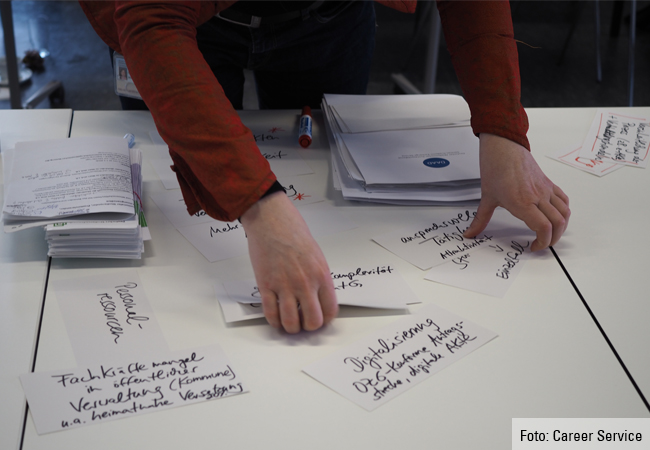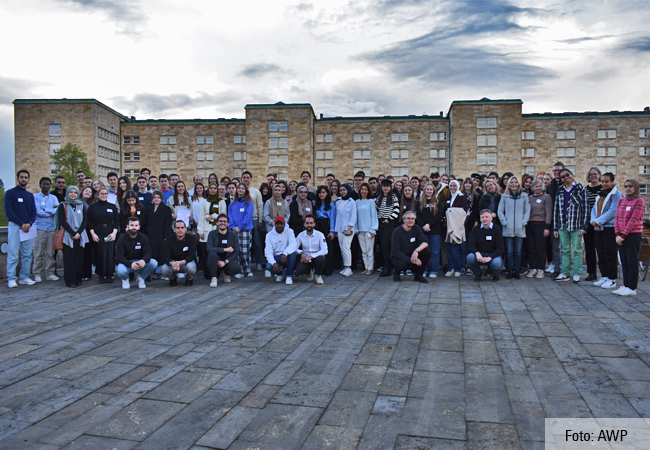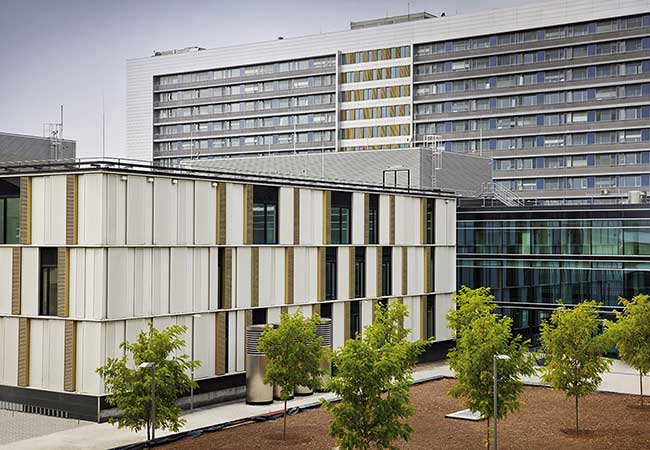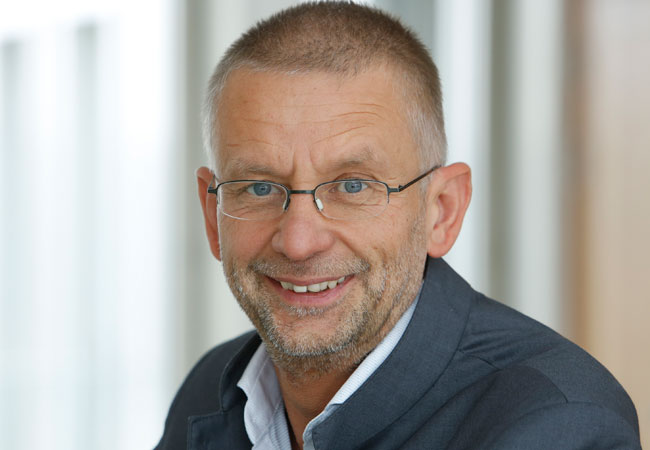 Ultimately, a video conference is no substitute for meeting in person: For a Vice President of Internationalisation, visiting current or future partner universities is basically part of the job description. Professor Rolf van Dick, who is responsible for internationalisation, as well as early career scientists, equal opportunities and diversity in the Executive Board, was a guest at the University of Toronto at the beginning of December. A strategic partnership bonds Goethe University and the University of Toronto; in his travel notes, van Dick reports on the many ways the trip to Canada was worthwhile.
Ultimately, a video conference is no substitute for meeting in person: For a Vice President of Internationalisation, visiting current or future partner universities is basically part of the job description. Professor Rolf van Dick, who is responsible for internationalisation, as well as early career scientists, equal opportunities and diversity in the Executive Board, was a guest at the University of Toronto at the beginning of December. A strategic partnership bonds Goethe University and the University of Toronto; in his travel notes, van Dick reports on the many ways the trip to Canada was worthwhile.
Among our strategic partnerships, the University of Toronto can justifiably be considered a highlight. It’s not only one of the top Canadian universities, but one of the best universities in the world. It has twice as many students as we do (90,000), but four times the number of employees (20,000). We’ve been connected by a strategic partnership for ten years – an active partnership on both sides, involving student and teacher exchanges, joint conferences, and research projects. The fact that the city of Frankfurt is integrated in this partnership also has tangible advantages for our students, who can study in Toronto without paying tuition, thanks to Frankfurt providing scholarships for Canadian students attending summer school at Goethe University.
Keeping on each other‘s radar
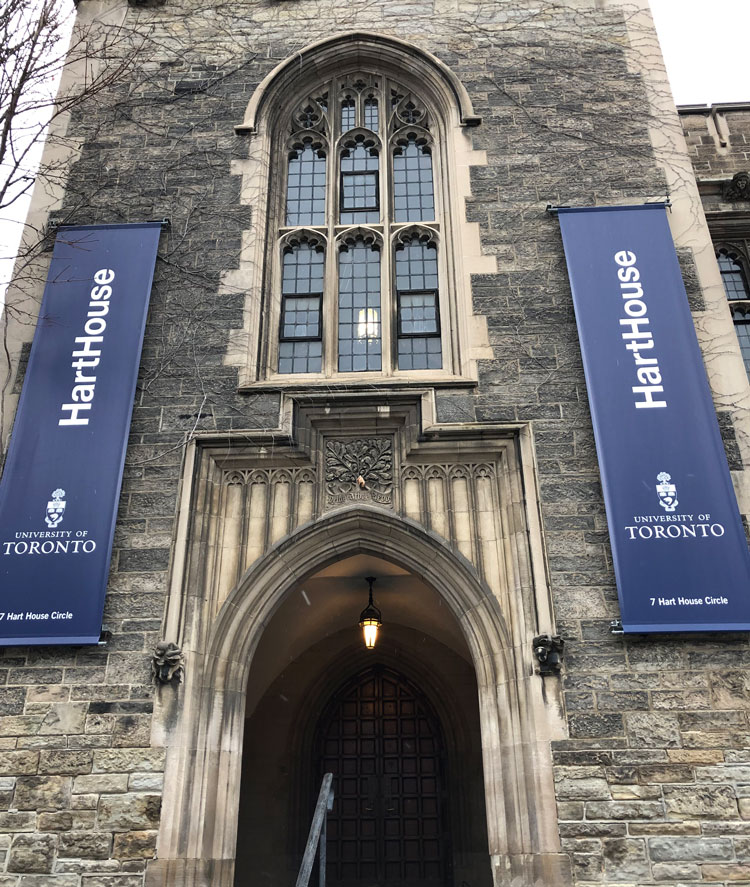 Dr. Martin Bickl, deputy divisional head of the International Office and department head for strategic partnerships and international marketing, who knows the city and university very well, accompanied me on this trip. While it was important to us to meet with university management, we also had many interesting and fruitful talks with members of the dean’s office and a total of 14 professors, in particular from the humanities and social sciences. Many of these scholars work closely with our colleagues in the Excellence Cluster Normative Orders and they repeatedly stressed that Frankfurt is a beacon on the hill in this area. There is strong interest in advancing joint research projects in the future, along with other projects – for example, an application for a joint graduate college is currently being planned. I was particularly inspired by my conversation with the legal scholar Markus Dubber who is from Germany but has been a professor in Toronto for many years. He heads the Centre for Ethics there and has initiated a lecture series on artificial intelligence that tackles the larger legal and ethical issues surrounding it. Goethe University also possesses a lot of expertise in this area and I could easily imagine a similar format in Frankfurt.
Dr. Martin Bickl, deputy divisional head of the International Office and department head for strategic partnerships and international marketing, who knows the city and university very well, accompanied me on this trip. While it was important to us to meet with university management, we also had many interesting and fruitful talks with members of the dean’s office and a total of 14 professors, in particular from the humanities and social sciences. Many of these scholars work closely with our colleagues in the Excellence Cluster Normative Orders and they repeatedly stressed that Frankfurt is a beacon on the hill in this area. There is strong interest in advancing joint research projects in the future, along with other projects – for example, an application for a joint graduate college is currently being planned. I was particularly inspired by my conversation with the legal scholar Markus Dubber who is from Germany but has been a professor in Toronto for many years. He heads the Centre for Ethics there and has initiated a lecture series on artificial intelligence that tackles the larger legal and ethical issues surrounding it. Goethe University also possesses a lot of expertise in this area and I could easily imagine a similar format in Frankfurt.
Even though our partnership has lasted so long and functions so well: it’s not self-propelling. Especially when it comes to a university this renowned, it is easy to vanish from the radar if personal relationships are not maintained. Our visit to the University of Toronto’s Executive Board was the first in several years, and the scholars and scientists there let us know how important it was that we again strengthened our personal ties to the university leadership. The visit, we were told, even had the effect of several joint project applications with Frankfurt, which had previously been on hold, suddenly being propelled forward with a tailwind.
College structure with Harry Potter flair
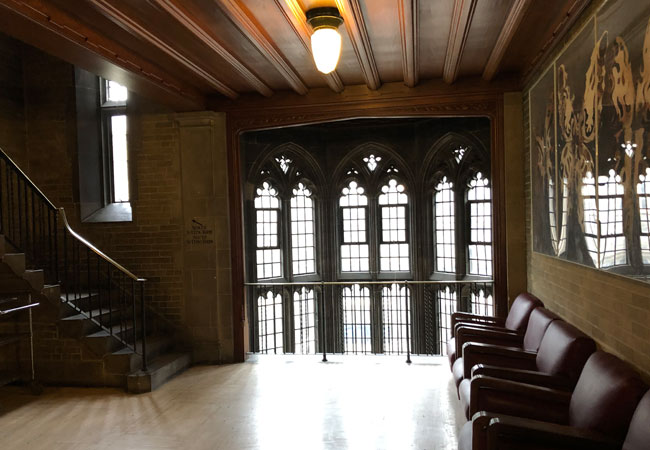 The University of Toronto is divided into several colleges whose architecture recalls for me the historical university buildings in Oxford and Cambridge, and its cafeterias and student dormitories exude a hint of Harry Potter. There is something uplifting about special atmospheres like this, and I find they can have a stimulating effect on conversation – I noticed this clearly, for example, at the impressive Gallery Grill. I think it would be great if – for graduation ceremonies for example – we could also provide our students with a similarly beautiful setting worthy of the event, for example if the event took place in the ceremony hall (alte aule) in Bockenheim with its palatial character.
The University of Toronto is divided into several colleges whose architecture recalls for me the historical university buildings in Oxford and Cambridge, and its cafeterias and student dormitories exude a hint of Harry Potter. There is something uplifting about special atmospheres like this, and I find they can have a stimulating effect on conversation – I noticed this clearly, for example, at the impressive Gallery Grill. I think it would be great if – for graduation ceremonies for example – we could also provide our students with a similarly beautiful setting worthy of the event, for example if the event took place in the ceremony hall (alte aule) in Bockenheim with its palatial character.
The college structure has real benefits for students: the large university is scaled down into manageable units; matters such as campus student housing are managed by the colleges rather than the university as a whole. Interestingly, however, the benefits and functioning of this organisation seem to be somewhat fuzzy with regard to scholars and scientists – the structure appears to be interwoven in a fairly complicated way.
The fraternities that are elsewhere so popular in North America are prohibited at the University of Toronto. The excessive partying, and certain initiation rites apparently went too far in the past. …But university leadership apparently puts more trust in its female students; several sororities are allowed to make their contribution to campus life in Toronto.
My visit to Toronto made one thing very clear to me: there can be no a top university without a top infrastructure. And in this respect, Goethe University simply cannot keep up with the University of Toronto: there are no overcrowded seminars in Toronto, professors are almost completely freed from the organization of exams, which is carried out by the exam office instead – but of course this all requires a corresponding funding basis.
Author: Rolf van Dick



